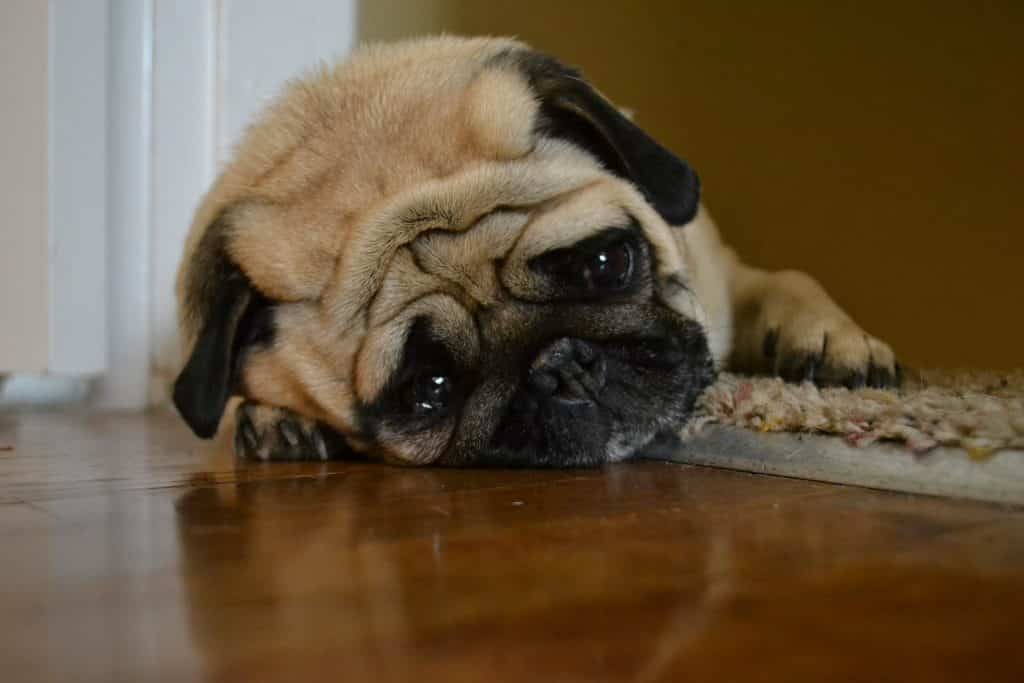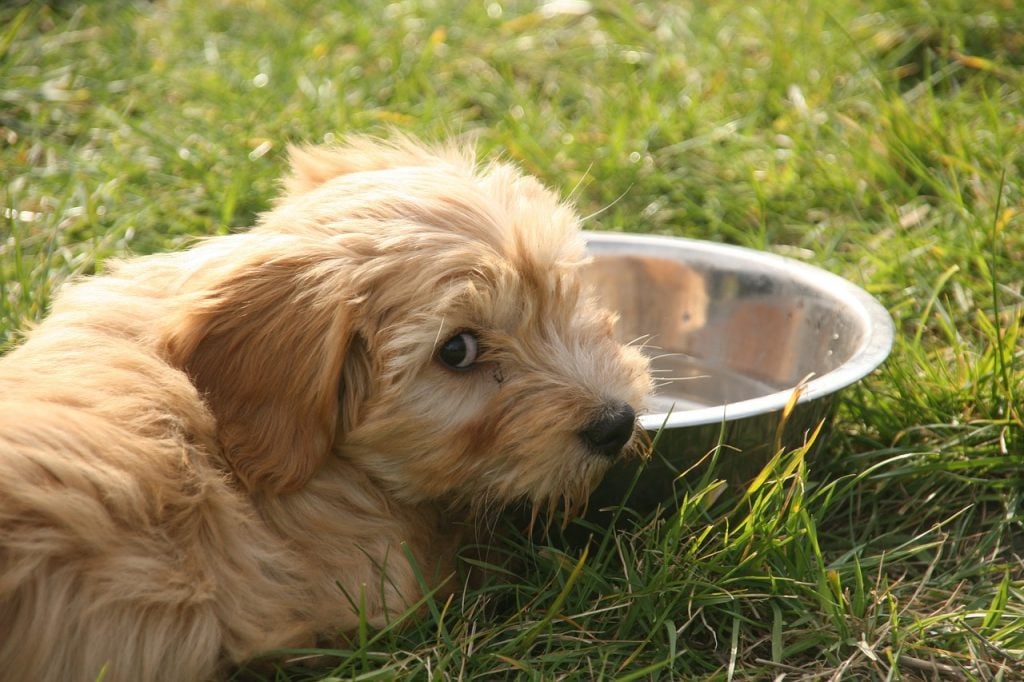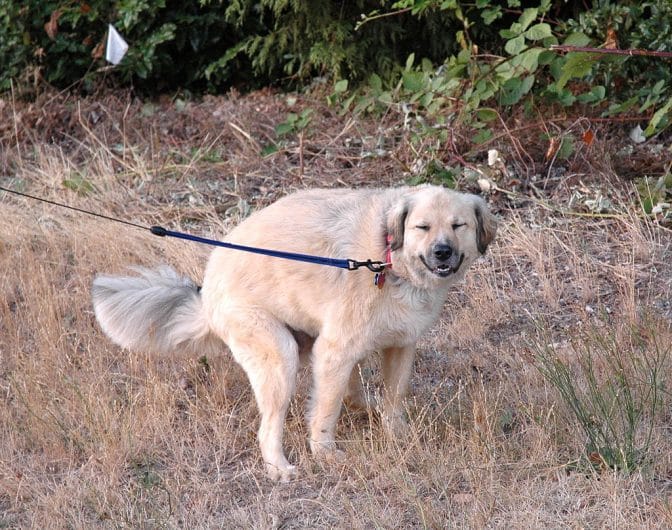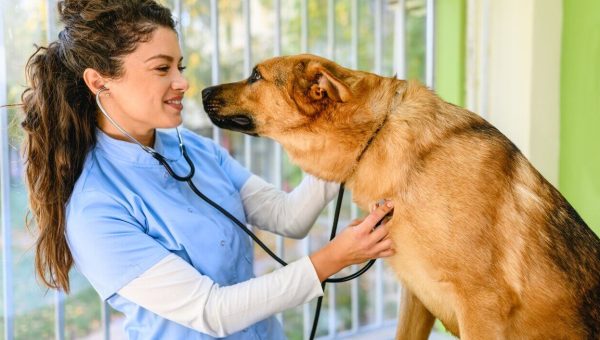- Not a substitute for professional veterinary help.
Diarrhoea isn’t fun to talk about, but it’s important to think about if you’re a dog owner. The fact is, for most dog owners, your pup will have a case of diarrhoea at some point.
To help you take care of your dog’s digestive issue as quickly as possible, we’ve compiled all of the need-to-know information. So relax, plug your nose, and let’s take a look at what causes dog diarrhoea and how to get your dog’s gut back in order.
How do I know if my dog has diarrhoea?
It’s important to remember that dog diarrhea isn’t a disease but rather a symptom of other diseases. Diarrhoea can indicate mild health problems like bacterial infections, but it can also be a symptom of serious issues like cancer, organ failure, or inflammatory bowel disease. It’s also one of the first symptoms of parvo.
Regardless of disease severity, it’s important to pay attention to signs of dog diarrhoea. Because if it goes untreated, your dog can suffer from dehydration and nutrient loss.
According to PetMD, you should look for the following warning signs of acute diarrhoea:
- Loose stool
- Soft stool
- An increase in the volume of stool
- More frequent bowel movements
- Blood or mucus in the stool
- Straining to defecate
- Change in mood
- Fever, fatigue, or weakness
You may be wondering: what should dog poop look like? Healthy dog poop is chocolate brown, log-shaped, solid but not hard, and moist enough to squish when touched (I know it’s gross, but stick with me here because you want to resolve your dog’s diarrhoea situation, right?). For more information, check out Rover.com’s illustrated guide to dog poop.
What are the causes of diarrhoea in dogs?
Diarrhoea is a sign that your dog isn’t digesting their food properly. Therefore, they’re not incorporating nutrients, fluids, and electrolytes that are essential to dog health. Common causes of dog diarrhoea include:
- Overeating
- Foods that are toxic to dogs
- Eating rotten food or ingesting poisonous substances like certain plants or household cleaners
- Eating non-food items like socks or toys
- A sudden or dramatic change in diet
- Allergies
- Illness caused by bacteria, intestinal parasites, or worms
- Underlying medical conditions like cancer, colitis, or kidney and liver disease
- Medications
- Stress or a change in routine
How do you stop dog diarrhoea?
Since dog diarrhoea can indicate serious disease—and because it’s uncomfortable for your dog—you should try to get their digestive system back on track as soon as possible.
1. Put your dog on a 12-24 hour fast.
Fasting helps a dog’s digestive system rest and can allow the cause of diarrhea to clear out. Always offer your dog water, even if they’re on a temporary fast from food. Vet, Dr. Robert J. Silver, recommends a 24-hour rice water fast.
“Rice water is the creamy liquid that results from boiling white rice in water,” he writes. “It’s important to use a good quality white rice; “minute” rice does not work and brown rice has too much fibre in it, which does not help firm the stool because it speeds the transit of digested material through the colon.”
2. Give your dog a probiotic.
Silver says giving your dog a probiotic can establish healthy bacteria in the gut and could speed up recovery. Probiotics can be purchased from pet shops or through your vet. He suggests mixing probiotics into the water your dog is drinking during their fast.
3. Serve simple, bland food after fasting.
Finally, consider giving your dog a mix of rice, water, and small amounts of protein after a bout of diarrhoea. Plain boiled chicken with cooked rice or pasta and probiotics mixed in is a good option. As your dog’s stool begins to normalise, you can gradually reintroduce their regular diet. A couple of tablespoons of plain cooked pumpkin can also help firm up your dog’s stool.
4. Take your dog to the vet.
If your dog’s diarrhoea is severe, bloody, or accompanied by abdominal pain or loss of appetite, you should go to the vet to rule out more serious medical issues. Make sure you can describe the colour, consistency, frequency, and smell of your dog’s stool as these are all important clues for figuring what’s wrong with your pup. You may even want to take a photo or bring a sample of your dog’s stool for the vet to examine.
The quality of the stool can indicate various diseases. Grey or orange dog poop could mean organ trouble. Black poop (i.e. tarry stool) might indicate a more serious issue like internal bleeding. Poop with white bits might mean worms. Watery or shapeless dog poop might mean a problem with their gastrointestinal tract.
To identify the cause of diarrhoea, your vet will likely run diagnostic tests to rule out potential diseases.
How can you prevent diarrhoea in dogs?
Diarrhoea is a malfunction in the digestive system, so you can help prevent this uncomfortable condition for your pup by making sure they’re putting nutritious food and water into their body—and nothing else. Start by:
- Making sure your dog can’t access food scraps or rubbish.
- Avoiding sudden changes to your dog’s diet—all food transitions should be gradual.
- Avoid the activities that you know are stressful for your dog.
- Give your dog high-quality food that will keep their digestive system functioning optimally.
- Making sure they’re eating fresh dog food.
If you have a dog, they’re likely going to get a case of the runs at some point. Though diarrhoea should not be taken lightly, with some strategic preventative measures, time to detoxify their digestive tract and a temporarily bland diet, you should be able to nip most cases of diarrhoea in the bud. If your little buddy is feeling under the weather and you don’t want to leave him alone, there are plenty of wonderful sitters who’d be happy to provide some TLC on Rover.com.






